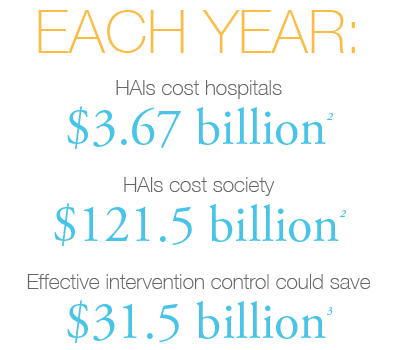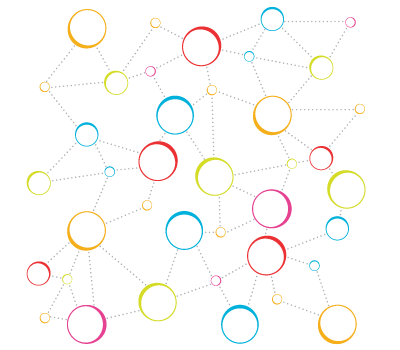The Impact of HAIs
A common misconception is that quality healthcare is the unique burden of the medical team or the location of care. In fact, everyone contributes to the overall experience and quality of care for both themselves and others. We all play a role.
One hundred million people contribute to or access the healthcare system annually. When looking at who enters any location of care, the current best-case scenario suggests that no more than 20% actually ‘know their role’. That 20% represents those currently defined as medical “providers”, leaving 80% of people (patients, friends & family) with no idea how to behave in a medical setting.
Healthcare facilities have the burden of reducing HAIs. In order to decrease the number of infections, facilities must be able to control the environment. With 75,000 people dying from HAIs annually1, our goal is simple: make that number ZERO.
With 1 in 25 people contracting healthcare-associated infections each year1, resulting in a 9x longer hospital stay, we rely on our security expertise to not only create a safe environment for patients, but for everyone who enters a facility. The experience creates an environment with everyone in mind, ensuring the highest levels of compliance across the board.

We all play an important role in experiencing quality healthcare.
The ultimate goal in healthcare is for the patient to return home to resume their daily activities as quickly and safely as possible. To experience this, everyone surrounding the patient plays an important role. While we all understand the role of the medical teams, we all too frequently underestimate the impact of patient and visitor education. There is a proper way for friends and family members to “behave” in a healthcare setting. Visitors can contribute to the quality of care by reducing the possible sources of infection for the patient. Knowing your role as a visitor can be as important as the medical care itself.
CONSIDER THIS:
We all learned from a young age how to behave in the library. We must use our “library voice” and we know that if our individual behavior is disruptive, it affects the quality of the experience for other library visitors. Once we learn how to behave in the library, we expect and rely on others to do the same. When applying this same concept to healthcare, we can teach appropriate behavior in a healthcare setting and increase the quality of care for everyone.
How does IntelliCentrics assist in healthcare?
IntelliCentrics connects, communicates and informs a growing community of nearly 1 million people spanning the spectrum of individuals from the Chief of Staff, to the friends and family member’s of the patient so that everyone knows how to perform their role. We work to make sure everyone who enters a location of care understands their role in experiencing quality health care.
Here is a quick look at the history of this concept:
As far back as 1000 BC, the ancient Persian cult of Zoraster outlined the process for physician “licensure.” The Vendidad, a book of religious law, states that to earn the right to practice medicine a candidate had to prove himself by successfully treating three heretics. If all three lived, he was considered fit to practice medicine for “ever and ever.” If all three died, he was denied the right to practice medicine.
As ancient as this example is, the principals are precisely what healthcare follows today. There are two distinct components.
1.) Firstly, there is a “Credential” which is defined as a skill or ability and
2.) secondly, is the “Privilege” which is the right to use a given skill or ability.

How does IntelliCentrics assist in healthcare?
IntelliCentrics connects, communicates and informs a growing community of nearly 1 million people spanning the spectrum of individuals from the Chief of Staff, to the friends and family member’s of the patient so that everyone knows how to perform their role. We work to make sure everyone who enters a location of care understands their role in experiencing quality health care.

Here is a quick look at the history of this concept:
As far back as 1000 BC, the ancient Persian cult of Zoraster outlined the process for physician “licensure.” The Vendidad, a book of religious law, states that to earn the right to practice medicine a candidate had to prove himself by successfully treating three heretics. If all three lived, he was considered fit to practice medicine for “ever and ever.” If all three died, he was denied the right to practice medicine.
As ancient as this example is, the principals are precisely what healthcare follows today. There are two distinct components.
1.) Firstly, there is a “Credential” which is defined as a skill or ability and
2.) secondly, is the “Privilege” which is the right to use a given skill or ability.
As far back as 1,000 BC, these two distinct components were utilized to determine who was authorized to practice modern medicine. While the set of credentials have thankfully evolved, thereby continuously increasing the ‘skills’ of those who practice medicine, the body of evidence suggests a massive opportunity for improvement remains given the enormous costs and overruns that often define healthcare today. Assessing the skills of medical providers is performed in abundance. However, all other groups are dramatically underserved.

